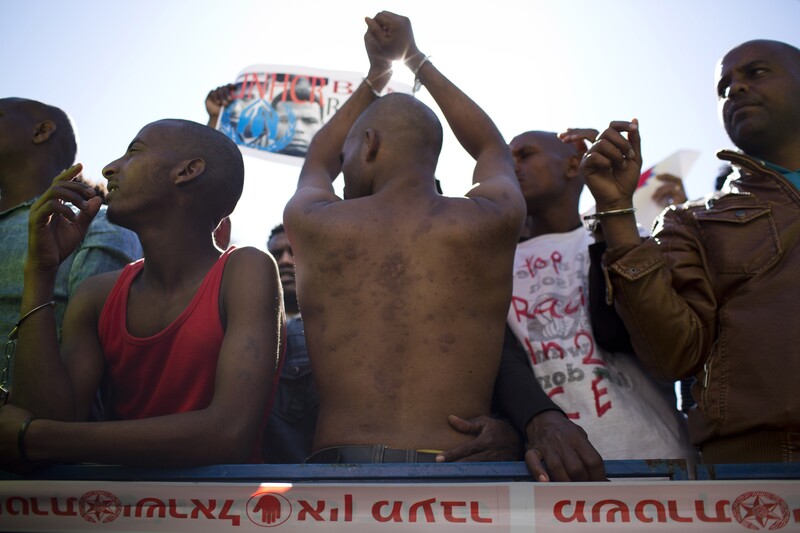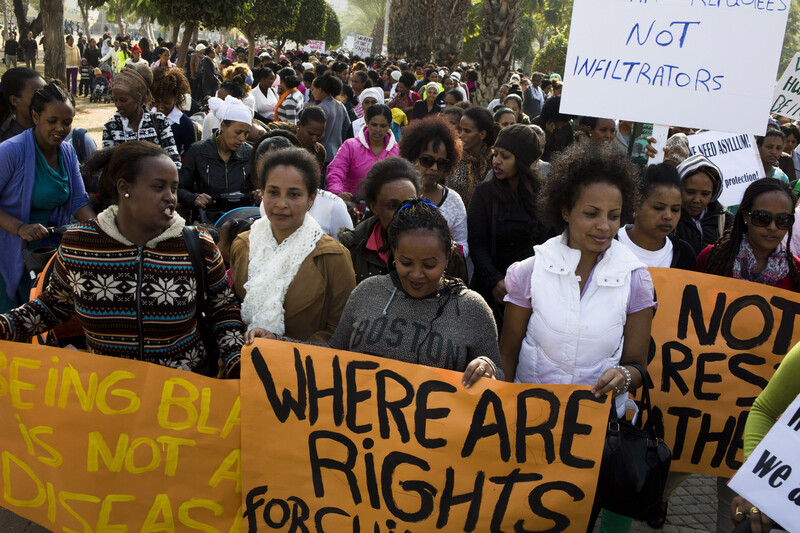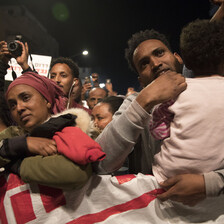The Electronic Intifada 22 January 2018

An African asylum seeker, bearing scars of torture inflicted by Egyptian smugglers, participates in a protest calling on the Israeli government to recognize refugee rights in front of the Tel Aviv offices of the UN refugee agency UNHCR in February 2014.
ActiveStillsIn the coming weeks, the Israeli government will begin issuing ultimatums to thousands of African refugees, informing them that they have 90 days to leave the country, or be jailed indefinitely.
If Israeli government officials get their way, this will be the final installment of the annual racist ringleaders series, where I call out the figures and institutions that have spearheaded the state’s efforts to rid the country of refugees from Africa.
If their plans come to fruition, there will no longer be a need to document Israel’s ongoing war on African refugees, because this war will already have been “won” – at great human cost.
10. Ophir Toubul, activist
In Israeli society, where political power is not only dependent upon socio-economic status, but also upon one’s racial designation and religious identity, marginalized groups often rely upon whatever leverage they are left with to try to improve their lot.
Some marginalized Jews blame their hardships on Israeli governments past and present, and on the economic elites they serve. They see other disadvantaged groups in Israeli society not as rivals scrambling for scraps in a zero-sum battle royale, but as allies-in-waiting in the struggle for equity and increased prosperity for everyone living in the land.
But others have resorted to expressing resentment towards those even worse off than themselves.
Ophir Toubul belongs in this latter category.
In 2016, Toubul founded Golden Age, an organization which aims to advance the interests of Mizrahi Jews in Israel, a historically marginalized group which traces its origins to Arab lands.
Instead of fighting for better living conditions for all, however, Toubul has found common cause with an Israeli government that seeks to cleanse the country of refugees.

Women asylum seekers and their children march against the detention of refugees and call on the Israeli government to recognize their rights, Tel Aviv, January 2014.
ActiveStillsBefore Israel built a border fence cutting off the flow of African refugees into the country, it sent arriving asylum seekers to the central bus station in southern Tel Aviv, without increasing services to the long-neglected neighborhoods around it with large Mizrahi populations.
The government pitted the two communities against one another, then reaped the rage of the Jewish residents as ammunition in its war on African refugees. Right-wing legislators regularly visited South Tel Aviv, assuring veteran Israeli residents that the recent African arrivals were to blame for their problems. The lawmakers then claimed that the anti-African sentiment of veteran Israelis, which they themselves had stoked, justified expelling the refugees from the country.
Toubul is determined to drive the wedge further. He argued in a Facebook post last February that “It’s time to dismantle the African ghetto created in South Tel Aviv.”
He added: “It’s time to end the carnival of refugee aid groups and demand that they vacate South Tel Aviv.”
Palestinian rapper and community activist Tamer Nafar slammed Toubul and Miri Regev, the Israeli minister who incited a 2012 South Tel Aviv pogrom against African refugees, in an opinion piece published in the daily newspaper Haaretz:
“Miri Regev and Ophir Toubul are not the New Mizrahim. Take note: the Golden Age [Toubul’s organization] and Regev are actually the New Whites. It’s not accidental that they sound like Donald Trump.”
9. Sheffi Paz, activist
Street gangs patrol Israeli cities, violently harassing non-Jews in an attempt to drive them out altogether.
The anti-miscegenation group Lehava, primarily active in Jerusalem, directs its racism primarily towards Palestinians. The South Tel Aviv Liberation Front headed by Sheffi Paz, meanwhile, focuses its efforts on expelling African refugees.
Paz and her allies regularly badger black people in public places and demand that they leave the country immediately. The group’s targets realize that if they respond in any way, Paz could call the police and have them arrested on bogus charges. So aggrieved asylum seekers, already leading a precarious existence, generally suffer these slings in silence, powerless to protect themselves.
South Tel Aviv Liberation Front activists approach African men and women on the street and try to foist condoms onto them to publicly proclaim, without any sense of shame, that the African birth rate in Israel should be nil.

Sheffi Paz, seen in center holding red megaphone, leads residents in the South Tel Aviv neighborhood of Shapira in a protest against African asylum seekers, August 2015.
ActiveStillsNot even children are spared from South Tel Aviv Liberation Front’s hate. Visit one of the few public parks in downtown Tel Aviv, and you may come face to face with Paz and her posse taunting black boys and girls – because they can.
Paz has parlayed her street-level leadership into financial gain and political influence. This year, she appealed to Israelis over the Internet, asking for funds to ramp up her racist provocations. Within weeks, Paz had managed to crowdsource cash donations well in excess of the approximately $122,500 goal she gave herself.
8. Itzik Braverman, mayor
In November 2016, Israeli teenagers lynched Babikir Adham-Uvdo, an African refugee, in the Tel Aviv suburb of Petah Tikva.
Adham-Uvdo’s face was mercilessly pummeled to the point that his own brother was unable to recognize him. His body was identified by the missing fingers he had lost back in Darfur, from where he had fled to Israel.
Adham-Uvdo was lynched right outside Petah Tikva city hall. Instead of trying to reassure African refugees in the city, in the months following the murder mayor Itzik Braverman made efforts to expel them. His municipality began to cut off electricity and drinking water to subdivided apartments housing African refugees, who face housing discrimination.
The municipality has claimed that it was not targeting refugees, but cracking down on building violations.
ACRI, the civil rights organization which represented the asylum seekers in the case, said that 80 percent of the residents of the targeted apartments were Eritreans and Sudanese.
A court ruled in August last that Braverman could continue cutting off basic services to African refugees.
In 2015, Braverman wrote a letter to Silvan Shalom, interior minister at the time, to say that forbidding refugees from living in Tel Aviv and Eilat but not Petah Tikva had “caused great disappointment amongst city residents and fears that their personal security will be harmed.”
But in February, Braverman publicly admitted that the refugees conduct themselves lawfully.
“Most of them are here legally and do no harm,” Braverman told city residents. “Their share of Petah Tikva’s crime is small.”
So what’s Braverman’s true motivation for driving them out?
“You walk through Founder’s Square, you see blacks drinking beer. It’s not nice,” he told constituents.
In other words, the real crime of these African refugees – their only crime – is the color of their skin.
7. Avi Dichter, member of Knesset
Avi Dichter, a former head of the Shin Bet, Israel’s secret police, has worked for more than a decade to expel African refugees from Israel. Ten years ago, while minister of internal security, Dichter determined that African refugees who are caught crossing into Israel would be returned to Egypt.
Though more subtle, Dichter’s current efforts to furnish Israeli authorities with tools to drive out African refugees may prove no less effective.
Since 2011, he has promoted a bill which would ensure that the government’s efforts to expel all African refugees cannot be impeded, even temporarily, by the Israeli high court. The bill, which would have the power of a constitutional amendment, would subordinate democracy and individual civil rights to the interests of a Jewish state.
In recent years, Israel’s high court has rejected ammendments to the country’s anti-refugee legislation because they violate the principles of democracy.
Once Dichter’s new law is passed, however, those considerations will be automatically superseded by so-called “Jewish interests.”
In the opinion of Prime Minister Benjamin Netanyahu, these Jewish interests include minimizing the number of non-Jews in the country.

African asylum seekers take part in a silent march to the EU offices in Tel Aviv to call on the Israeli government to recognize their rights, January 2014.
ActiveStillsWhen African refugees were just beginning to arrive in Israel a decade ago, Dichter did not make much effort to hide his disdain for them.
In July 2007, in Hadera, a town in northern Israel, a “security patrol’ established by the mayor raided an orchard and detained a group of African refugees, physically forced them onto buses, drove them out of town, and dumped them in a public park more than 100 kilometers away.
In 2011, an Israeli magistrate’s court fined Hadera’s mayor and city council approximately $80,000 over the unlawful incident.
But Hadera’s mayor and “security patrol” won Dichter’s praise. Dichter, then the minister for internal security, urged that these squadrons be established all across Israel.
6. Moti Yogev, lawmaker, and the Derech Chaim movement
Like Avi Dichter, Moti Yogev is an Israeli lawmaker sponsoring a bill which would block the high court from overturning, or even watering down, any legislation passed by Israel’s parliament, the Knesset.
But Yogev’s proposed law is even more draconian than Dichter’s.
If Dichter’s “nation state” bill would bar the Israeli high court from overturning laws that contravene principles of democracy, Yogev’s proposed legislation would strip the high court’s ability to overturn any law passed by the legislature, regardless of the reason.
If the aim of the “nation state” bill is to promote Jewish sectarian interests, the aim of the Yogav’s proposed legislation is to promote Jewish religious interests. While Yogev champions the bill in Israel’s parliament, it is the Derech Chaim movement, and its leader Rabbi Yitzchak Ginsburgh, who actually initiated it.
Derech Chaim aims to turn Israel’s ethnocracy – a semi-secular state that favors ethnic Jews – into a theocracy, a state whose laws are the Torah and Talmud, with no separation between synagogue and state. Ginsburgh is a guru of the Israeli far-right who wrote the introduction to The King’s Torah, a religious tract that sanctions the murder of non-Jewish babies, on the premise that they could pose a threat if allowed to grow to adulthood.
In trumpeting his bill’s supposed merits, Yogev has taken to signing off with “Restore our judges as in former times, and our counsellors as of yore; remove from us sorrow and sighing, and reign over us, you alone,” which is understood in religious circles as a call for the Jewish people to be ruled by unelected kings and clerics.
Yogev has made the racist rationale behind his new bill very explicit.
In March 2013, Yogev cofounded an Israeli parliamentary lobby that aimed to return African asylum seekers to their home countries. In October that same year, Yogev uploaded a video of himself walking around Ashdod, describing African refugees as “infesting” the city. This turn of phrase, which posits African refugees as subhuman insects that must be expelled or exterminated, is sadly a familiar trope in Israeli society.
In July 2015, Yogev said that “A D-9 [heavy bulldozer] should be raised at the high court.” A month later, he stated that his outburst was prompted by a high court ruling forbidding Israel from jailing African refugees indefinitely, in order to force them to leave of their own accord, rather than being deported by the state.
Under extreme pressure from Israel’s far-right government, however, that ruling would not protect refugees for long.
5. Ayelet Shaked, justice minister
For years, the pattern was the same: the Israeli government would pass a draconian anti-African measure in the Knesset, local human rights groups would challenge it, and the high court would strike it down.
Justice Minister Ayelet Shaked has taken a series of actions to alter the balance of power between the legislative, executive and judicial wings of the government – or strip the court’s powers altogether.
Miriam Naor, the outgoing president of Israel’s high court, resisted some of Shaked’s efforts to strong-arm the judiciary, describing her efforts to stack the high court with right-wing jurists as “bringing a gun to the table.” But Naor has since retired from the bench, and the rest of the court’s chief justices seem to have internalized Shaked’s message.
In August, Naor began referring to African refugees in court using only the government’s preferred slur for them: “infiltrators.”
The following month, the court ruled that the government is forbidden from employing asylum seekers from Eritrea and Sudan, putting thousands of refugees at risk of losing their jobs in cleaning and maintenance for municipalities.
The court also ruled that the state can withhold 20 percent of the wages asylum seekers earn from private employers, as employers are required to with foreign workers, even though doing so puts impoverished refugees in an even more precarious position.

African asylum seekers protest in Tel Aviv’s Rabin Square calling for the release of refugees imprisoned by Israel, January 2014.
ActiveStillsIsrael’s chief justices have also shown leniency towards the government when it has not fulfilled its commitments to the court regarding the status of asylum seekers, allowing the state to buy more time despite consistently acting in bad faith.
With the government ramping up its efforts to expel refugees, the justices know their demands will soon be moot.
The court ruled last year that Israel could now deport refugees back to Africa without their consent, as long as the countries they were being deported to agreed to take them against their will. Shaked’s pressure had paid off.
The government renegotiated its agreement with Rwanda to comply with the high court’s dictates, paving the way for mass deportations.
In December, the government told the court that it planned to begin mass deportations within weeks.
4. Avi Gabbay, opposition leader
Once Israel’s high court cleared the way for the government to expel African refugees, the next step was to ratify the plan in the Knesset.
Newly elected Labor party chief Avi Gabbay justified his support for the proposal by saying, “We don’t have to be more righteous than the High Court of Justice.”
Prior to his leadership run, Gabbay had no affiliation with the Labor party. Even now, he is not a member of the Israeli parliament, and cannot become one until the next national election, currently scheduled for 2019.
The deportation plan does not need Labor’s support as all parties in the governing coalition agreed to support its passage.
But Gabbay urged Labor lawmakers to champion it, saying that failing to do so would cost the party votes in the next general election.
“We would pay a heavy price for opposing the bill,” he said.
In the first Knesset vote on the bill, 11 lawmakers in Labor’s coalition voted in favor of it.
By the time the bill was brought to the Knesset for a final vote, pressure from anti-racist activists convinced some Labor party backbenchers to reverse their votes and oppose the measure.
But this last minute resistance was ineffectual on all counts: Labor was unable to peel away any parliamentary seats from its more openly racist rivals; Gabbay demonstrated that he can’t effectively lead his own party, much less a whole country; the anti-refugee bill easily passed in the parliament, regardless.
3. Moshe Kahlon, former finance minister
Like Gabbay and the leaders of several other Knesset factions, Moshe Kahlon came to head his Kulanu party after working under Prime Minister Benjamin Netanyahu and his ruling Likud party.
In early July, the Israeli government was determining which converts to Judaism would be recognized by the state. Hoping to head off a high court decision ordering the state to recognize conversions performed by more liberal streams of Judaism, ultra-Orthodox factions of the government proposed a new bill that would maintain their own hardline rabbis’ exclusive control over conversions.
Under the new proposal, conversion to Judaism via its liberal streams would not be sufficient to earn a person Israeli citizenship. This would leave vulnerable American Jews, a plurality of whom are affiliated with those liberal streams.
Why did the ordinarily pragmatic Kahlon side with the ultra-Orthodox on this issue, angering American Jews?
According to Kahlon, if Israel recognizes conversions to liberal streams of Judaism, “There will be a flood here of groups from Eritrea.”
Over the last decade, a relatively small but significant number of African refugees – including those in romantic relationships with Jewish Israeli citizens – have asked the state for permission to convert to Judaism. Their requests have been rejected outright.
Back in 2004, before the vast majority of African refugees arrived, Kahlon proposed a law, never enacted, that would have punished anyone who enters Israel without a permit by not allowing them to acquire legal status until after a period of 10 years outside the country.
2. Aryeh Deri, interior minister
“As interior minister, it is my job to deport everybody who enters illegally.”
So Aryeh Deri told the Knesset’s Interior and Environment Committee, which oversees the state’s treatment of African refugees, in July.
For two full years now, Deri has presided over what one researcher called “the most effective anti-irregular migration mechanism in the world.”
In April last year the liberal Haaretz newspaper excoriated the Israeli government for this mechanism.
“The ways Israel has of making life difficult for asylum seekers, and in so doing avoiding its legal and humanitarian obligations toward them, are proliferating,” the editorial, published on Israel’s Holocaust Remembrance Day, stated.
Months later, the paper published interviews with African refugees whom Israel had coerced to “voluntarily” deport. They confirmed what earlier investigations had also revealed: The African refugees Israel sends to Rwanda do not receive state protection there, but instead have their documents taken away, and are forced to begin their search for asylum all over again.
According to those who survived the renewed ordeal and managed to make it to Europe, many of their fellow refugees pushed out by Israel ended up dead in Libyan torture camps, or drowned at the bottom of the Mediterranean.
Upon publication of these reports, Haaretz publisher Amos Schocken tweeted a list of top Israeli ministers who have led Israel’s war on Africans, calling them “murderers in suits.”
All of those listed have been included in previous editions of this annual racist ringleaders roundup.
Two of them top the lists for both 2016 and 2017: Aryeh Deri and Benjamin Netanyahu.
The only real difference between the two top Israeli leaders is that Deri will still only flaunt his anti-blackness in Hebrew, playing to hometown hatred. Netanyahu, by contrast, is now brazen enough to boast about it English as well.
In January, Netanyahu tweeted in English his support for Donald Trump’s plan to build a wall between the US and Mexico, touting his own anti-African border fence as a “great success.”
When Netanyahu’s statement caused friction with Mexico, and Mexican Jews broke the Jewish Sabbath to protest the anti-immigrant invective, Deri begged the prime minister to take back his words. Netanyahu refused.
1. Benjamin Netanyahu, prime minister
“The refugees that arrived here from Sudan require protection and refuge, and their absorption is a supreme moral obligation, in light of the history of the Jewish people and the values of democracy and humanism.”
Benjamin Netanyahu – and a majority of the 120-member Knesset – signed their names onto this text a decade ago, when Netanyahu was leader of the opposition in parliament.
Just a few years later, once Netanyahu had returned to the prime minister’s office, his government began to persecute African refugees in earnest, starting to stamp their visas with clauses stating they were forbidden to work.
How could Netanyahu – or anyone for that matter – express their support for these refugees, and then retract that support as soon as they were in a position to enforce it?
Twelve years ago, dozens of mainstream US Jewish groups published a full-page ad in The New York Times invoking Jewish suffering in the Nazi Holocaust, and calling upon then US president George W. Bush to take action to end the atrocities in Darfur.

A rightwing protester hangs balloons as Eritrean asylum seekers hold a ceremony mourning deceased relatives, De Modina park, South Tel Aviv, February 2014. Every Saturday African asylum seekers from the Eritrean community would gather to commemorate their loved ones who perished in Eritrea or in the Sinai desert on the way to Israel. Rightwing protesters claimed the noise caused by mourners disturbs them.
ActiveStillsMany, but not all, of those same Jewish groups have maintained a deafening silence about Israel’s war on African refugees. Why did their so-called solidarity disappear?
A recent Gallup index on the treatment of migrants around the world ranked Israel as sixth from the bottom.
During a tour of Tel Aviv in August, Netanyahu made a point of including in his entourage Sheffi Paz and other South Tel Aviv Liberation Front activists, walking with them hand in hand, and posing for photographs.
These calculated photo-ops sent the Israeli public a clear message: that Netanyahu gives his full-throated support to racist street gangs who aim to cleanse the country of all African refugees.
Barring any unforeseen intervention, Netanyahu and the rest of Israel’s racist ringleaders will soon see their wishes fulfilled.
David Sheen is an independent writer and filmmaker. Born in Toronto, Canada, Sheen now lives in Dimona. His website is www.davidsheen.com and he can be followed on Twitter: @davidsheen.
Tags
- African refugees in Israel
- Israel's racist ringleaders
- Ophir Toubul
- Golden Age
- Tamer Nafar
- Sheffi Paz
- South Tel Aviv Liberation Front
- Itzik Braverman
- Babikir Adham-Uvdo
- Petah Tikva
- Avi Dichter
- Hadera
- Moti Yogev
- Derech Chaim
- Yitzchak Ginsburgh
- Ayelet Shaked
- israeli high court
- Israeli Knesset
- Miriam Naor
- Avi Gabbay
- Moshe Kahlon
- Benjamin Netanyahu
- Aryeh Deri
- Amos Schocken





